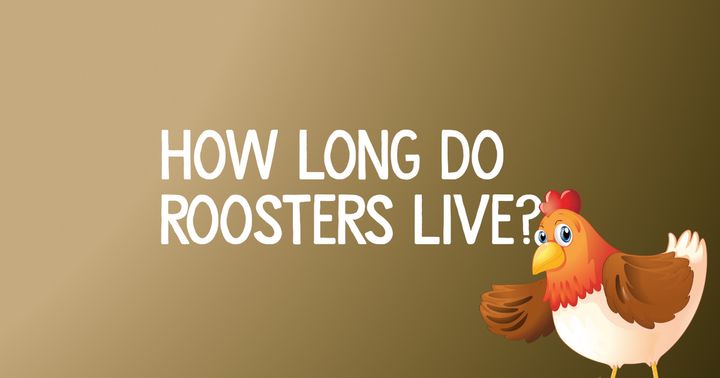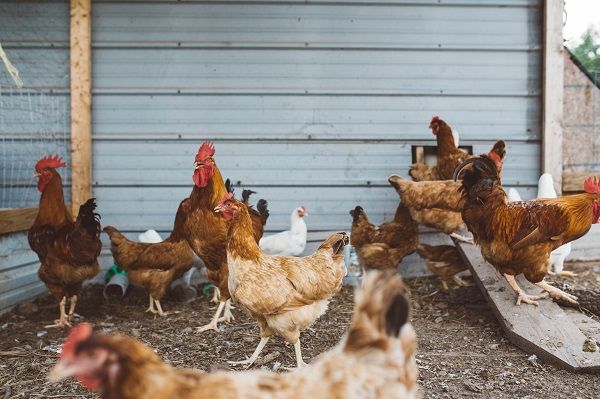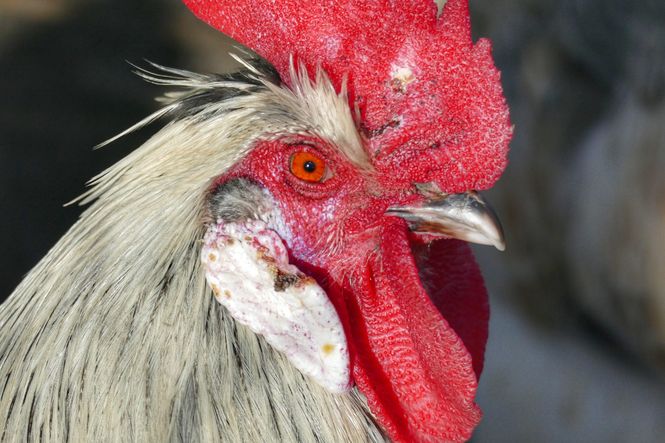How Long Do Roosters Live?


Roosters are fantastic animals full of personality. They protect their flock from predators and internal discord. They hunt for treats for their hens and keep them from straying too far from home.
Introducing a rooster to your hens is a great way of creating a more natural living environment for them. Their behavior will be more reminiscent of how it would have been in the wild.
They're also beautiful and interesting creatures. The shuffle dance used as part of their courting process is a majestic sight, and their infamous crowing is woven inextricably into the idea of country living.
But if you're thinking about bringing a rooster into the equation, you may be curious how long they tend to live. Let's find out.
Table Of Contents
Lifespan
On average, a rooster will live between 5 and 8 years. This is pretty typical in birds of this size; however, in ideal living conditions, it's not unheard of for a rooster to survive as long as 15 years.
In rare circumstances, a lucky rooster might even reach the ripe old age of 20! Imagine being woken at the crack of dawn every morning for 20 tired years. It'd certainly save you money on alarm clocks.
But why are there such inconsistencies when it comes to rooster life expectancy? Let's discuss the factors that can cut short or prolong a rooster's life.
Space
This is a huge contributing factor when it comes to the length of a rooster's life. Like all animals, they need plenty of room and a little bit of freedom.
If a rooster has plenty of space to roam, all the exercise it gets will keep it in prime physical condition. But it's not just physical well-being space provides. Just as with humans, the mental health of animals doesn't get the attention it deserves.
The stress caused by living in a cramped environment will drastically reduce a rooster's lifespan. Add that to a lack of proper exercise and physical development, and the poor little guy doesn't stand much of a chance at all.
The minimum amount of outdoor space required to keep your rooster happy is 35 square feet. 50 would be ideal. If you have more than one rooster, they'll both need their own spaces of this size.
Food
Food amount and type is another major factor when it comes to the health of these birds. Roosters require a balanced diet including carbohydrates, fats, proteins, vitamins, and minerals. As they age, their diet should be adjusted.
It can be exceedingly difficult getting your rooster to eat right, especially if you own hens as well. They have very different dietary requirements.
Layer ration or layer pellets are a chicken feed with high levels of calcium. This sort of food is perfect for laying birds as the calcium content helps them to produce eggs with strong shells, but it's that very thing that makes them toxic for roosters.
If they eat these pellets regularly it's unlikely they'll even make it to the 5-year mark. The calcium can fatally damage their kidneys and cause big problems in other organs too.
A feed store will be able to provide a nutritionally complete diet for a rooster. If that's not an option, or you just want to treat your feathered friend with a feast, they enjoy eating carrots, pumpkins, lettuce, cracked corn, stale bread, cooked oatmeal, berries, and cauliflower.
To help roosters make full use of the nutritional content of their food, they should be given extra grit a few times a week. This will aid the digestive process.
You should also pay attention to the seasons when it comes to feeding time. In winter, they'll need slightly more food as they'll be using more energy to keep warm. When it gets to summer, they'll need constant access to clean water.

Housing
Another essential aspect of a robust rooster's day to day is adequate housing.
Leaving them without a house even for one day can affect their well being, so make sure you've got a coop ready before they arrive at your place.
A rooster's house needs to be fairly spacious and incredibly well kept. A high level of hygiene will keep them happy and reduce the chance of illness. It has to be draft-free, dry, and all together weather-resistant.
You should avoid using any slippery materials in the flooring as their legs can be quite fragile.
Predators
The biggest challenge you face as a keeper of roosters is protecting them against predators.
The numbers and variety of predators will depend on your location, but you can guarantee there are at least a few hungry eyes hiding in the dark.
Common predators include foxes, wildcats, snakes, eagles, wolves, coyotes, raccoons, weasels, possums, and owls. It can be incredibly difficult to protect your lovely little alarm clock against all of these threats.
The best possible course of action begins with learning what threats are local to you. Then you can take tailored steps to protect against each one snatching up your rooster.
To prevent predators from digging into your coop, you should dig the hard-waring chicken wire at least 2 feet into the ground.
Solid roofing on the housing and chicken wire over any runs will protect against any airborne attacks. Hanging old CDs from surrounding trees can also help deter bird attacks.
Unfortunately, there isn't much you can do to stop snakes getting inside unless the coop is completely blocked up. Check the coop daily for snakes.
If you keep finding the same ones, you may have to relocate them yourself to stop them from returning.
Competition
Roosters are incredibly territorial and hardwired to protect their flock and compete for superiority over other roosters.
The injuries and stress caused by living too close to another rooster will reduce their average lifespan hugely.
Roosters often take on so much responsibility, they have heart attacks and simply drop dead on the spot. It's a lot of pressure being a rooster.
Company
It sounds incredibly cheesy even when it comes to chickens, but one of the key components in getting a happy, healthy, ancient rooster is love.
Roosters need care. They like to socialize with other chickens on a daily basis for the same reasons humans need to be around other humans.
In addition, they enjoy the interaction with us as well, especially if they've been around humans their whole lives.
They should be petted and shown affection. This will reduce stress levels and make them feel protected and loved.
Although company can be a great thing, roosters don't like change at all. If something were to happen to their hens, they'd be affected and the stress may even shorten their life.
Breed
Different breeds of rooster have slightly different life expectancies.
Landrace chickens are known for being a little tougher than other breeds. They tend to live for around 8 years whereas a bantam rooster will last anywhere between 4 to 8 years.
Illness
Learn Your Rooster
Illness can wreak havoc on your chickens. It's important to really get to know your rooster and hens as individuals.
If you can build an understanding of their personalities by observing them closely, it shouldn't be too difficult to tell when they're feeling under the weather.
You can get to know your rooster by simply spending a lot of time with them. After a few days, you might begin to notice their schedule.
Perhaps they have a favorite hunting ground for insects, they like to visit first thing. Then they might take guard on some high ground and look for predators for a while.
You may be surprised how organized chickens can be. If you start to notice deviations in your cock-a-doodle-dude's day plan, it might mean something is wrong.
You should take this as a cue to pay closer attention and dig deeper.
Checking for Illness
Chickens will often display quite noticeable symptoms when they're ill.
Checking for any obvious signs of disrepair daily is a great way to get ahead of things if the worst does happen.
Respiratory Symptoms
You should listen out for a rooster making any unusual sounds.
They may develop something of a cough, a rasp, or a sneeze like hacking. Perhaps their dawn call is noticeably quieter. These are all symptoms of respiratory ailments.
Roosters are susceptible to a few different respiratory ailments. Catarrh, as it's known here in the US, is a common cold. Obviously, for humans, a cold is a nuisance and rarely anything more, but for chickens, the mortality rate is around 20%. Fortunately, it's easily remedied.
Infectious Bronchitis is the most contagious of all the respiratory diseases that affect chickens. It's actually a strain of coronavirus and it has around a 30% mortality rate in younger chickens and around a 10% mortality rate in mature birds.
It's important to familiarise yourself with as many of these diseases as possible. The more prepared you are, the better chance your rooster has of living a long and wonderful life.
Ocular Symptoms

Roosters will often exhibit symptoms in their eyes. There might be a dimness in their usually twinkling eye or a runny discharge.
This could mean any number of things. Here's a list of the possible causes of symptoms visible in the eyes of roosters: bacterial infections, fungal infections, respiratory infections, nutritional deficiencies, genetic problems, nervous system disorders, or developmental disorders.
Keep an eye on your rooster's eye! It could save their life.
Problematic Stool
Roosters may sometimes have what appears to be diarrhea. It should be pretty identifiable.
Their stool will be excessively runny and discolored with an awful stench.
Diarrhea in roosters can be caused by excess eating, worms, antibiotics, coryza, eating toxic items, too much protein, coccidiosis, or a viral infection.
Tumors
It can be incredibly difficult to find a tumor underneath all that luscious plumage, but there may be other tell-tale signs that you should give a rooster a good check up.
If a rooster is displaying a lethargic temperament, is refusing food, seems depressed, is losing weight, or has lameness in one of their legs, you should be concerned and seek professional help.
Sudden Chicken Death
Sudden chicken death is sort of a blanket term for a lot of reasons a hen or rooster may die without having shown any prior symptoms.
Common causes are heart attacks, hidden parasites or asymptomatic viruses, impacted crop, or trauma.
SCD can be especially jarring for owners as it appears to come out of the blue, no time to prepare or to try and help the bird.
Reducing Infection Rates
There are plenty of infectious diseases that can decimate entire flocks.
If you believe your rooster or one of your hens is sick in any way, it's important you separate them from the flock immediately just in case their illness is infectious.
It may be quite a stressful experience for the already poorly bird, but it could be the difference between losing one or your entire flock.
Summing up
Roosters are dutiful to a fault. Responsibility, and thus conflict, is in their genetic code.
They're selfless and brave creatures and because of this, they're often in more danger than a lot of other animals.
Due to their nature and the constant threat of predators and illness, it can sometimes feel like there's simply nothing you can do to help.
But if you take heed of all the areas covered in this article, you're going to keep your rooster and your entire flock as healthy, contented and safe as possible.
Who knows, maybe your rooster will end up breaking some records, bucking the trends, and living longer than any other rooster has before.

